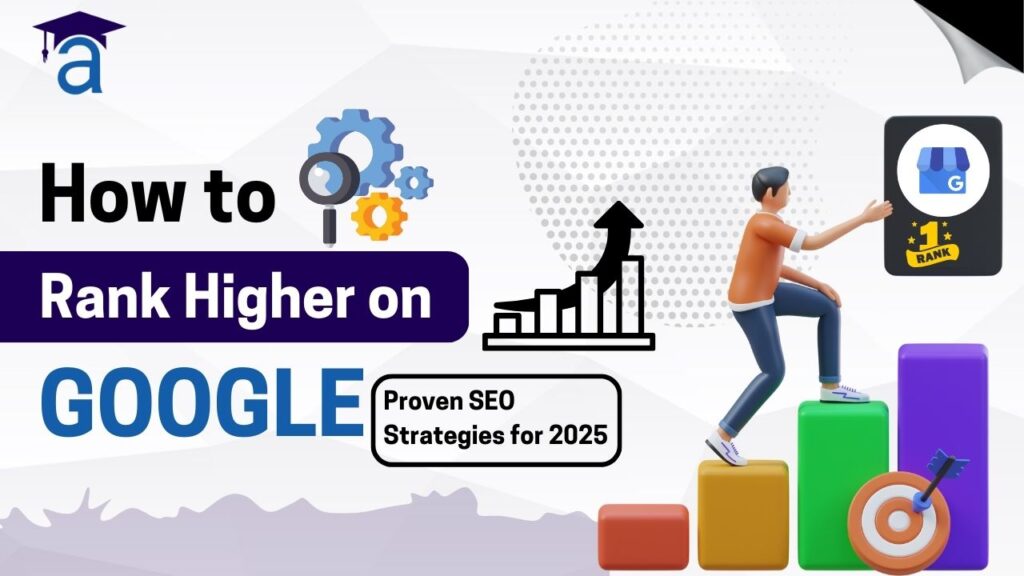
Best Top Digital Marketing Company in Dehradun
Best Top Digital Marketing Company in Dehradun The Search for a Premier Digital Marketing Service in Dehradun: Why It Matters Dehradun isn’t just about hills,

“Ninety percent of users never scroll past the first page of Google.”
— A surprising insight that reminds us just how crucial visibility is online.
Ranking higher on Google is important because most of users never scroll past the first page of Google. If you’ve been scratching your head wondering, How to Rank Higher on Google. Whether you’re a newbie or a seasoned pro, understanding the latest trends of SEO is key to online success. This article dives into the details of modern SEO techniques, providing you with actionable insights to increase your online presence.
Google’s algorithm is like an ever-evolving puzzle, and figuring out how to rank higher on Google can seem difficult at first. Imagine a constantly shifting maze where the rules keep changing—yep, that’s pretty much it To start off, let’s look at some of the critical factors:
It’s clear that E-E-A-T isn’t just jargon; it’s a game changer. When a website exhibits genuine experience and deep expertise, Google is more inclined to reward it. I mean, who wouldn’t trust a website that shows it’s been around the block a few times? This approach is not only about meeting algorithmic requirements but also about establishing credibility with your audience.
Understanding Google’s ranking factors and the role of E-E-A-T makes the whole ranking puzzle a bit more approachable. While it may seem overwhelming, breaking it down into manageable parts can help demystify the process. Let’s get into the foundation of it all—keyword research.
Keyword research is the unsung hero when it comes to mastering SEO. At its core, finding the right keywords is like discovering hidden treasure. The question remains: how do you pinpoint the perfect keywords that will power your search engine visibility?
For instance, imagine you run a tech blog. Instead of solely targeting “tech news,” you might focus on “latest smartphone release reviews 2025.” This nuanced approach not only narrows your audience but also helps establish authority in your niche. Experts in the field often suggest mixing both types to create a balanced strategy that maximizes reach while ensuring relevancy.
Now, let’s talk about on-page SEO. Honestly, it’s not rocket science, but it does require a bit work.
It’s all about creating a seamless user experience.
Content is the heartbeat of your website, and there’s no denying that creating high-quality content is paramount when aiming for ranking higher on google, It’s all about providing real value to your readers. High-quality content is informative, engaging, and original. It’s like crafting a great story that not only informs but also entertains.
Consider the following pointers for crafting stellar content:
Also, don’t be afraid to sprinkle in your personality—readers can sense a genuine voice. It’s this authenticity that helps in building trust and establishing authority.
A well-structured site is like a well-oiled machine—it runs smoothly and efficiently. To truly understand how to improve your website visibility online, you need to make sure that the technical aspects of your website are in best shape.
First, focus on website speed. Fast-loading pages are not only user-friendly but also favored by Google’s algorithm. Next, consider mobile responsiveness; with a growing number of users accessing content via smartphones, a mobile-optimized site is non-negotiable. Additionally, proper URL structuring, secure HTTPS connections, and an XML sitemap are all vital components that contribute to a robust technical foundation.
Each of these technical tweaks works in harmony to elevate your site’s performance. As you address these elements, you’re setting the stage for smoother indexing and better user experience that will eventually boost your site ranking.
Off-page SEO is where your website’s reputation gets built—think of it as networking for your digital presence. Building quality backlinks remains one of the most effective ways to enhance your authority and search engine rankings.
Diversifying your backlink profile is key. Here are some effective strategies:
Every backlink is like a vote of confidence from another site. However, quality is far more important than quantity. A single link from an authoritative website can have more impact than dozens from lesser-known sources. As you build these connections, keep in mind that the ultimate goal is to enhance your credibility. With a well-rounded off-page strategy, you’re well on your way to mastering SEO.
The journey doesn’t end once you implement these strategies—measuring your performance is just as crucial. Tracking your progress allows you to see what’s working and what might need some changes.
Start by leveraging tools like Google Analytics and Search Console to monitor metrics such as organic traffic, bounce rate, and conversion rates. Here are some quick pointers to keep in mind:
Each metric tells a story, and by piecing them together, you gain a clearer picture of your website’s performance. A continuous cycle of testing, analyzing, and refining will eventually lead to sustainable growth.
Ready to take your website to the next level? Dive into these strategies with enthusiasm and a willingness to experiment. With persistence and a dash of creativity, you’ll not only improve your rankings but also forge a genuine connection with your audience. Now’s the perfect time to implement these insights and start your journey toward digital success.
Remember, what works today might need adjustments tomorrow. So, stay curious, keep learning, and always be ready to adapt.
A: Simply put, most users never scroll past the first page. When you rank higher, you’re getting way more eyeballs, which means more traffic, credibility, and, ultimately, conversions.
A: High-quality content is not just about stuffing keywords; it’s about being informative, engaging, and authentic. When your content genuinely helps readers, it naturally earns trust and backlinks, boosting your Google ranking.
A: Technical SEO might seem a bit nerdy, but it’s super important. Focus on things like website speed, mobile responsiveness, secure HTTPS connections, clean URL structures, and having an XML sitemap. These tweaks help Google crawl your site more effectively.
A: When reputable sites link to you, Google sees it as a vote of confidence. It tells the search engine that your content is worth checking out, which can really boost your ranking.
A: Use tools like Google Analytics and Search Console to keep tabs on your traffic, bounce rate, and conversions. Monitoring these metrics helps you see what’s working and where you might need to tweak your strategy, ensuring your SEO game remains on point.

Best Top Digital Marketing Company in Dehradun The Search for a Premier Digital Marketing Service in Dehradun: Why It Matters Dehradun isn’t just about hills,

What Is Off-Page SEO and Why Is It Important? (Beginner’s Guide to Building Authority & Rankings) Here’s a wild one: According to Moz, backlinks are

How Digital Marketing Helps Local Businesses Grow: Strategies That Work in 2025 Let’s be honest—running a local business today is a whole different compared to

SEO vs. Google Ads: What’s the Better Long-Term Strategy? You’ve probably heard this debate a hundred times already: SEO vs. Google Ads—which one actually works

Best SEO Practice for 2025: Future-Proof Strategies to Boost Your Rankings Let’s be honest — SEO isn’t what it used to be. If you’re still

Top Social Media Statistics Every Marketer Should Know in 2025 Social media has become an indispensable pillar of modern marketing. Its vast reach and ability